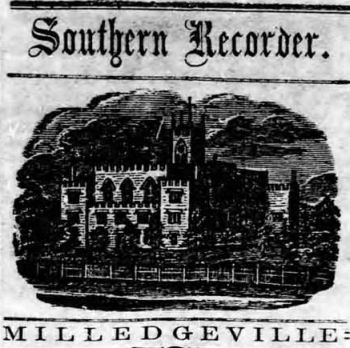 Today the Milledgeville (GA) Southern Recorder offers an analysis of the war and reports on the recent Confederate national day of fasting:
Today the Milledgeville (GA) Southern Recorder offers an analysis of the war and reports on the recent Confederate national day of fasting:
The present stillness denotes an approaching commotion in the war elements, which is soon to shake the country. Preparations on a large scale have been made by both parties for the conflict, and an advance guards on each side are almost in sight. Then the array of battle will be formed, and the largest military force ever collected in America, under Generals of skills and renown, will make the field another Waterloo in the grandeur of its results.
We are rejoiced at the entire confidence of the South in President Davis, and those to whom are entrusted the execution of his policy.
While the terrors of war are indeed not far away, confident projections of a southern victory prove quite near-sighted.
As to the Confederate day of “Fasting and Prayer” five days earlier, the paper reports that most all stores and businesses had closed, and city ministers participated in, the 11 AM event imploring God’s blessings upon the Confederacy:
The fact of a general Fast throughout eleven states, and the united prayers of all christians to “the Lord of Hosts to guide and direct our policy in the paths of right, duty, justice and mercy; to unite our hearts; to strengthen our weakness; crown our arms with success, and to enable us to secure a speedy, just and honorable peace,” will surely be heard in mercy by Him who holds the Universe in His hands, and orders all things for His glory and for the happiness of his creatures.”
Despite the claim to speak for “all christians” in the Confederacy, overlooked is the fact that African slaves, many of whom are also Christians, do not support the Confederacy. Nor are the Baptists of Milledgeville mentioned in the article, despite the fact that state Gov. Joseph Brown is a member of the First Baptist Congregation. While many southern Baptist congregations do participate in this day, and future days, of fasting and prayer, not all do.
In Georgia, even the directive of the Georgia Baptist Convention – meeting two months ago – for Southern Baptist churches to observe the June 13 day of fasting and prayer does not result in unanimous acquiescence. The Baptist heritage of church state separation yet remains embedded in the conscience of Baptists, even as Confederate nationalism swells. Throughout the war some southern Baptist congregations ignore denominational and government demands for days of fasting and prayer, a stance that does not necessarily imply opposition to the Confederacy itself.
Source (link)


